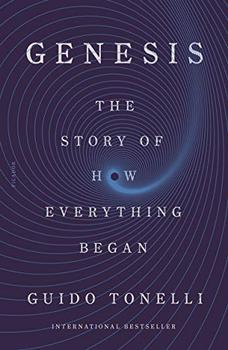Summary | Excerpt | Reviews | Beyond the Book | Readalikes | Genres & Themes | Author Bio

The Story of How Everything Began
by Guido Tonelli
The emergence of science ushers in modernity. Societies become dynamic, subject to continuous transformations; social groups enter a period of ferment, dominant classes undergo profound changes, and in the course of just a few decades the centuries-old balance of power is disrupted.
But the most profound transformations do not concern the way in which we communicate or produce wealth, our medicine or mobility. The most radical alterations are in how we look at the world, and therefore our place within it. The origin story provided by modern science very quickly acquires an unrivalled consistency and complexity. No other discipline can provide explanations that are more convincing, verifiable, coherent or consistent with regard to the myriad observations supplied by scientists.
And yet, despite the notion that we have progressively lost something of the magic and mystery that had accompanied us for millennia, the vision of the world that we have gradually developed through science is actually more amazing than anything we could have imagined before. It retells the story of our origins more imaginatively and powerfully than any mythological narrative. In order to construct this story, scientists have had to scrutinise the most hidden and minute corners of reality, and have explored the remotest worlds, coming to terms with states of matter so different from anything previously known to us as to nearly blow our minds.
From science we derive the paradigm shifts that define our epochs, and that irreversibly modify our relationships. And it is the ceaseless pressure of scientific discoveries that sets the tempo of this subterranean development, like the forces exerted upon the Earth's crust by white-hot magma, sometimes breaking it apart and irreparably transforming the landscape above.
Our lives are conditioned by the story of the origins of the universe told by science: it profoundly shifts the foundations on which we will build new social arrangements, opening up vistas full of opportunities and risks, and shaping the future for coming generations.
This is why, just as in ancient Greece everyone had to know the foundation myths of the polis, the origin story that is provided by science ought to be familiar to everyone. But for this to happen, we must first overcome a considerable obstacle. We need to come to terms with the difficulty of scientific language.
A Complicated Language
It all begins with an apparently marginal episode that took place just over four hundred years ago, and which has as its protagonist a Pisan professor of geometry and mechanics at the University of Padua. When Galileo Galilei began to modify the strange tube manufactured by a Dutch optician, converting it into an instrument for examining celestial bodies, he could hardly have imagined the trouble it would get him into; much less could he have foreseen the turbulence that his observations would create across the entire planet.
What Galileo sees through his system of lenses astonishes him. The Moon is not, after all, the perfect celestial entity described by the most authoritative texts. It is not composed of incorruptible matter, but has mountains, craters with jagged edges, and plains similar to our own. The Sun has stains on its surface and rotates on its axis; the Milky Way is a vast accumulation of individual stars; the 'starlets' surrounding Jupiter are orbiting satellites that resemble the Moon.
When in 1610 he publishes all this in his Sidereus Nuncius, he provokes, perhaps unwittingly, an avalanche that will undermine the system of beliefs and values that had prevailed for more than a thousand years and that no one had ever dared to challenge.
Copyright © 2019 by Giangiacomo Feltrinelli Editore, Milano
Translation copyright © 2021 by Simon Carnell and Erica Segre




Be sincere, be brief, be seated
Click Here to find out who said this, as well as discovering other famous literary quotes!
Your guide toexceptional books
BookBrowse seeks out and recommends the best in contemporary fiction and nonfiction—books that not only engage and entertain but also deepen our understanding of ourselves and the world around us.